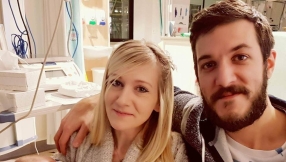
It's Children's Mental Health Week this week, but it's something we've been talking about for some time already, especially those of us who work with children and families.
Over the last few months I have become even more convinced that what the Church can do is vital – and I was already convinced about it!
I'm not talking about shiny, all singing, all dancing programmes for children. I'm not talking about getting face-to-face children's groups going again and struggling with extensive rules either.
It's bigger, and yet simpler than that.
It was sad that at the beginning of the pandemic many employed children's and family workers, and their national advisers, were furloughed - just at the point they were needed most. I wonder if some of that was due to misunderstandings from leadership teams of exactly what those valuable team members do.
Much could still have been done, even without face-to-face work. Families and children were still needing support, and yet the key people who could have helped them were out of the picture.
Having spoken with many, many children's and family leaders, both paid and volunteers, I've learnt a lot of what they have faced individually over these long months.
Some of those who were not furloughed found themselves working alone with little support, but with expectations upon them of quantifiable output through programmes and meetings that could be seen, and good enough to show off to the world via social media.
Few people with these expectations realised that putting these things online takes much more time, thought and technical expertise than face-to-face programmes, leaving little time for anything else.
In smaller churches, volunteer numbers had plummeted due to the fact many volunteers were in the clinically vulnerable age group who had been told to shield. Using Zoom wasn't working for many, especially now as more schools are using similar platforms for teaching.
Those paid and volunteer workers still working with families and children found themselves having to prioritise what to do because of lack of time due to programming expectations, and often had to miss some people out because they didn't have the resources. Sadly, these were often the families who have children with additional needs.
This lack of support for the workers also meant that much outreach didn't happen where it usually did.
As the Church in this land was rejoicing in the outreach opportunities that had arisen for adults, outreach amongst children - even with their own church families - had dropped.
The places where it hadn't dropped were those churches who valued the place of children within the church community, where the vital work parents were doing in raising faith in their children was recognised and supported. They were also the churches where children and family workers were supported and encouraged.
But here's the thing.
The places where children's mental health was best supported were not those with the best all singing, all dancing YouTube channels. It was those places where relationships were built, contact was maintained and conversations happened where:
- the conversation on the doorstep when dropping of resources was just as important, if not more, than the resource itself.
- the text message to the one child, even if unanswered, was vital.
- the conversation with a grown-up on a doorstep or through an open window, with the child hiding behind them and occasionally peeking out, was talked about by that child for days.
- the hidden sweet treat in a resources bag was cherished - and remembering an allergy showed you cared.
When you care enough to do those things, you carry the love of Jesus with you.
It's someone saying on the church WhatsApp, when it has snowed heavily all the way through the service, "Let's have a snowman competition!"
That's what happened with our church, with all ages joining in and loads of photos of snowmen, snow dragons and even snow guinea pigs making an appearance, along with beaming smiles on the faces of the children.
This is where a small church without big programmes is blessed indeed.
The work that our precious children's and family workers do to help and protect the mental health of the children is often not quantifiable, but it's vital.
We need to remember that they are just doing things that everyone should be involved with. They are leading the Church in doing what is truly intergenerational, showing that growing faith and resilience is everyone's responsibility. When these relationships are maintained, there is often an overflow to the community – and it carries Jesus with it.
As we consider the mental health of our children, remember it's not just about the programmes we write, it's the love and care we show. It's also everyone's responsibility – even if we employ a children's and family worker to help us do that.
Kay Morgan-Gurr is Chair of Children Matter and Co-Founder of the Additional Needs Alliance, part of the Evangelical Alliance Council. For more, www.kaymorgangurr.com and on Twitter @kaymorgan_gurr













